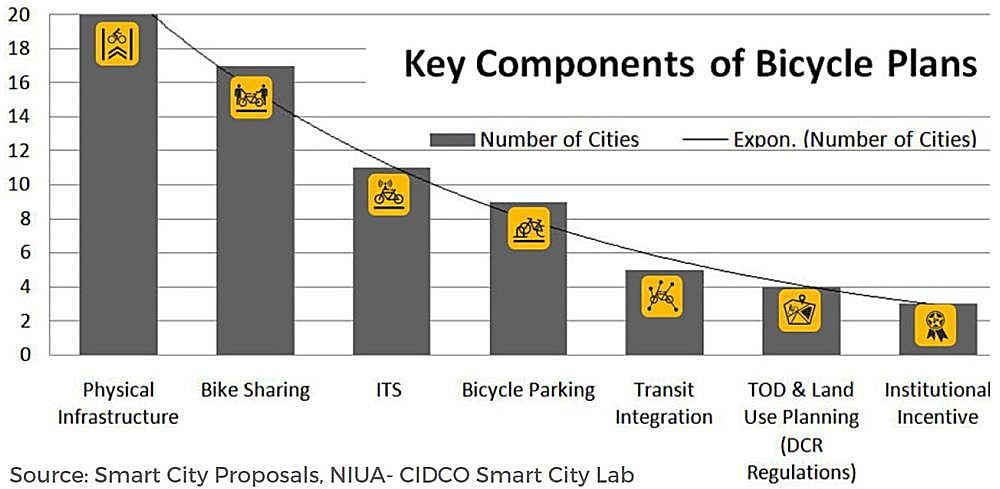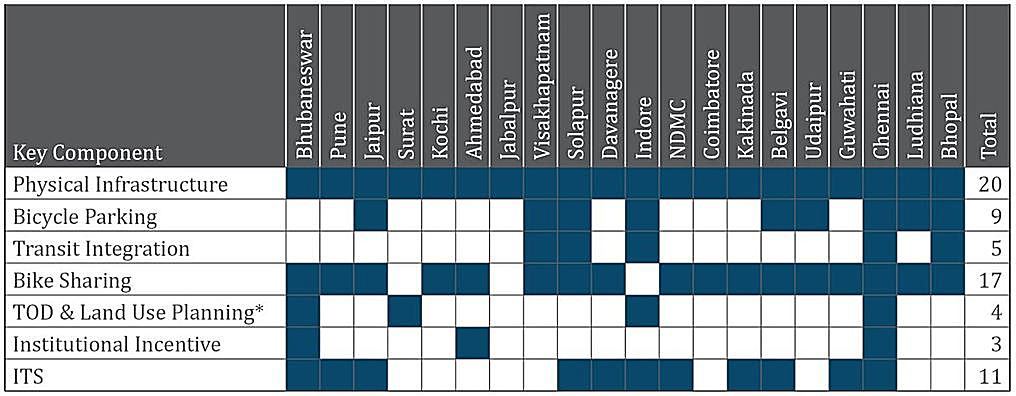
Smarter Cycling Series: Indian Government ready to inject $30 million into Smarter Cycling
As part of our work to help cycling and the bike industry into the world of smart, connected and shared mobility we are working with visionaries and leaders who are setting the tone in this new mobility. We are going to be inviting some of them to share their thoughts and visions with ECF.com in the coming months.
Siddharth Pandit heads the NIUA-CIDCO Smart City Lab at National Institute of Urban Affairs (NIUA) in New Delhi, India. NIUA is the policy and program management partner for the Ministry of Urban Development (MoUD), Government of India and works with it to manage its various flagship missions including the National Smart City Mission.
At the time of writing this article, the Indian junior cycling team has reached No. 1 ranking in the world, in the team sprint category. For us as a country deprived of both laurels in global competitive sports and bicycling in our urban spaces, this comes as a double shot of chai (or filter coffee). Be mindful, this team has achieved this ranking against all odds, lack of bicycle tracks in Indian cities as compared to other countries in that list - Korea, Japan, Germany and Sweden. Therefore the ponderance of this achievement will be appreciated by urban residents and children in Indian cities; cities of all scales where cycling is more than a commuting mode and more than a conversation piece (along with home crafted beer, vintage clothes and vinyl records) amongst liberal, climate change conscious yuppies.
The majority of lower income families in today's Indian cities work in service sector jobs (drivers, maids, security guards, sanitation workers, vegetable vendors) etc. The standards of public transportation and the congestion on the roads have a bigger impact on their commute to work. And far from the climate change conversation, this labor sector makes a rational choice of using the bicycle to commute to work. In fact the primary commuting mode in the top 53 cities in India is bicycling or walking, the highest being 57% and the lowest being 17%, still comparable to any bicycling/walking oriented cities in the world.
Bicycling is a livelihood means for vegetable vendors to sell their vegetables, it is a freight mode for decentralized waste management systems, it is an economic generator for all support jobs related to bicycling maintenance and repair shops seen strewn in any of these Indian cities. About 48% of the households in Indian cities own a bicycle, also considered as an household asset. The average trip length (excluding walk) in small, medium and large cities is between 2.5 - 6.9 km, distances that can easily be made by bicycling, walking and buses. Unlike in the bicycling capitals of the world, the bicycle has sustained in India despite the formal planning systems, not because of them. Despite the significance of this mode, the bicyclists have remained an invisible group for Indian city planners, until now. There were toolkits and plans made sporadically, and one successful implementation of a city wide network of bicycle lanes in the city of Diu. But largely bicycling has remained a low priority.
The National Smart City mission, when launched, gave cities the freedom to shape their vision of a smart city - a vision backed by citizens' validation. The central government laid out the general guiding principles of quality of life, economic development and inclusion. The cities had to assess themselves on 24 parameters of urban living, of which five were directly related to sustainable mobility. It was no surprise when the first 20 winners (lighthouse cities) were announced that all of them had addressed the need for bicycling in their smart city plans. While all 20 have proposed expansion of the physical bicycle network (roadspace), 17 have proposed a bike sharing component thereby taking out the economic burden to own a bicycle (interestingly it costs 8 times more to own a bicycle in India than in China which has 4 times more bicycles than India).

At an initial glance, about $25-$30 million or 0.8-1% of the national government's grant will be used by the 20 lighthouse cities for bicycling. While bicycling plans and investments have been done internationally at city levels, this leveraging of a national urban competitive grant to jumpstart sustainable mobility concurrently in 20 cities is probably a first. By the time all 107 cities have applied, we will see about $100-$150 million being used as seed funding by cities only for bicycle planning and infrastructure. If other planning interventions (TOD, urban design, greenways, pedestrian streets) that enhance bicycling experience in a city are considered, close to $1 billion in the Indian National Smart City mission will be utilized towards non-motorised transport. Urbanists and urban advocates from other countries will attest to the time it took to raise such funds for their bicycling campaigns.
Hands-on example
There is the city of Ludhiana, in the state of Punjab. This city is home to 1500 factories making bicycle parts and employing 250,000 people. More than 10 million units of bicycles are manufactured in Ludhiana every year and more than 50% of India's bicycles are made here. Yet, the city ranks high in per capita automobile ownership, accident rates and air pollution. One of the first 20 lighthouse cities,
Ludhiana now aims to utilize its manufacturing strength to achieve sustainable urban mobility, allotting $1 million of its smart city budget to bicycling.
These are the transformational changes the Indian Smart City Mission hopes to bring about. Stories of change that are not driven solely by bottom up demands or top down mandates but also through convergence of sustainability, inclusion, economic productivity and technology. India has always had a thing with bicycles, whether in Bollywood, political representation, youth culture - it's now time that Indian cities too have a dalliance with this two wheeled beauty.

Read more about Smarter Cycling and register for our Conference at Eurobike.
Regions:
News category:
Network/Project Involved:
Contact the author
Recent news!
Upcoming events
Contact Us
Avenue des Arts, 7-8
Postal address: Rue de la Charité, 22
1210 Brussels, Belgium










